RFS Briefings - March 2, 2021
Dear Colleagues,
The Howard Hughes Medical Institute (HHMI), a member of our Council of Academic Institutions, announced the selection of the 2020 Hanna Gray Fellows, a cohort of 21 early career researchers who are taking on some of the biggest challenges in the life sciences, such as understanding the inner workings of the brain or the complexities of the immune system. “These promising researchers are poised to do groundbreaking work and ready to inspire the next generation of scientists,” said HHMI President Erin O’Shea in a press release.
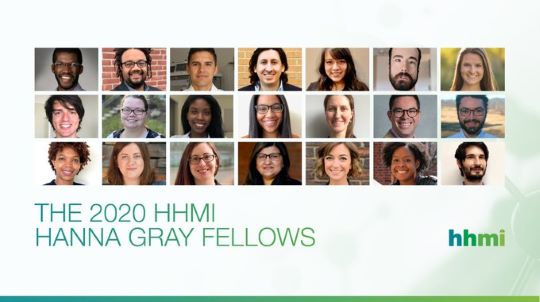
On the International Day for Women and Girls in Science, celebrated on 11 February, UNESCO and the L'Oréal Foundation honoured five women researchers in the fields of astrophysics, mathematics, chemistry and informatics as part of the 23rd International Prize for Women in Science. UNESCO also published a global study on gender equality in scientific research, entitled “To be smart, the digital revolution will need to be inclusive.”
Congratulations to Dr. Ruth Lehmann! She will receive the Vilcek Prize in Biomedical Science for her contributions to the understanding of primordial germ cells and the germ cell life cycle, and for her institutional leadership in the field. Dr. Lehmann is also a board member of Rosalind Franklin Society and was a feature speaker at our recent meeting: Labs, Leaders, Critical Connections.
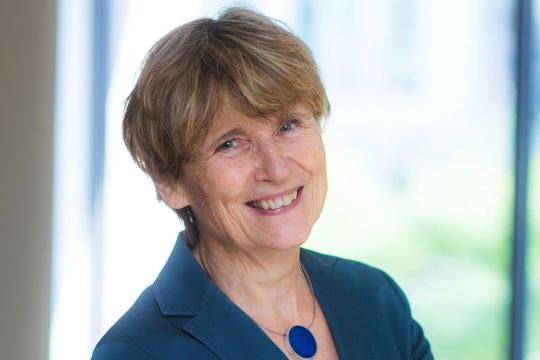 Dr. Ruth Lehmann. Courtesy of Gretchen Ertl. Dr. Ruth Lehmann. Courtesy of Gretchen Ertl.
Congratulations to Tara LeGates for being one of the finalists of the 2020 Eppendorf Prize. Tara LeGates completed a postdoctoral fellowship at the University of Maryland School of Medicine, where she established the importance of the strength and plasticity of hippocampus-nucleus accumbens synapses in reward-related behavior. Dr. LeGates is now an Assistant Professor at the University of Maryland Baltimore County (UMBC). Her lab studies how neuronal circuits integrate information to regulate behavior and their alterations in psychiatric disorders.
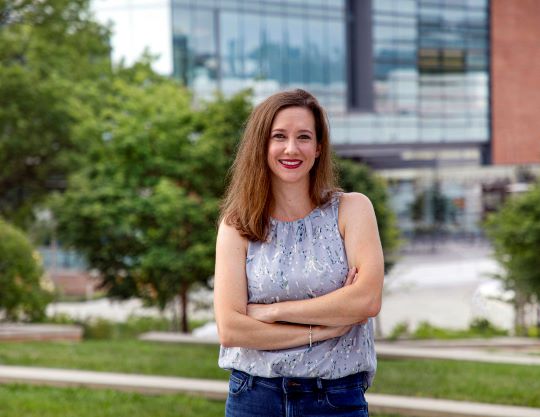 Tara LeGates. Credit: Melissa Penley Cormier. Tara LeGates. Credit: Melissa Penley Cormier.
Olufolakemi “Fola” Olusanya from Howard University and Chrystal Starbird from Yale University have received the inaugural Rising Black Scientist Award presented by Cell Press and Cell Signaling Technology. You can read their award-winning essays in the February 18 issue of the journal Cell. They will also receive a $10,000 award and $1,000 in scientific materials from Cell Signaling Technology. Read more about Yale postdoc Chrystal Starbird and Howard University Senior Olufolakemi “Fola” Olusanya.
Shirley Malcom, a speaker at our colloquium at the Wistar Institute, leads the SEA Change initiative at the American Association for the Advancement of Science which helps institutions transform themselves to recruit, retain, and advance the full diversity of people who are captivated by science. “I'm trying to help make a way for others, not by saying there's anything wrong with them but by addressing the issues that we know to be problematic within the system itself,” Malcom said in a recent article for Science.
Please continue to share important news and opportunities with us so that we may share it with you and others who are committed to supporting the careers of exceptional women in science.
With regards in these trying times,

Karla Shepard Rubinger
Executive Director
Rosalind Franklin Society
www.rosalindfranklinsociety.org
News
Piecing together the next pandemic. Dr. Jessica Manning, a public health researcher with the National Institute of Allergy and Infectious Diseases, is working in a small lab in Cambodia. She is on the lookout for emerging diseases. She plans to work with Cambodia’s center of communicable diseases, using metagenomics to start monitoring the animals in two local wet markets, where pathogens could make the jump to humans.
Dr. Marianne Legato wins PROSE Award in Biomedicine for “The Plasticity of Sex: The Molecular Biology and Clinical Features of Genomic Sex, Gender Identity and Sexual Behavior.” Since 1976, the Association of American Publishers Awards for Professional and Scholarly Excellence (PROSE Awards) have recognized the very best in professional and scholarly publishing by celebrating the authors, editors, and publishers whose landmark works have made significant advancements in their respective fields of study each year.
Millie Hughes-Fulford, NASA shuttle scientist, dies at 75. Millie Hughes-Fulford was NASA’s first female payload specialist. She conducted biomedical experiments on the physical toll of spaceflight on humans on board the space shuttle Columbia in 1991. She had aspired to fly to outer space since childhood, and finally achieved her goal on the space shuttle Columbia in 1991.
Arianna Rosenbluth dies at 93; Pioneering figure in data science. Dr. Rosenbluth, who received her physics Ph.D. at 21, was a physicist who played an important role in developing The Metropolis algorithm, a technique for generating random samplings. The algorithm became a foundation of understanding huge quantities of data. She died of complications of the coronavirus.
NASA Names DC Headquarters Building for ‘Hidden Figure' Mary Jackson. NASA has officially named its headquarters building in Washington, D.C., in honor of engineer Mary W. Jackson in a ceremony on Friday, February 26.
Rainwater Charitable Foundation announces second-annual Rainwater prize winners for brain research. Congratulations to Dr. Celeste Karch for winning the Rainwater Annual Prize for Outstanding Innovation in Neurodegenerative Research. She is an Associate Professor of Psychiatry, Washington University School of Medicine in St. Louis.
Supporting women in academia during and after a global pandemic. “More than ever, now is the time to challenge long-standing institutional traditions and policies that propagate gender inequity. Solving such widespread problems will not be easy, but with persistent effort and multipronged approaches, institutions can restructure academic science so that it supports and retains the best and brightest minds.” Here is a series of policy changes and institutional investments that will support the needs of women scientists so that we can achieve gender equity in academic science.
Scottish University draws ire for dismissing female gender studies lead. The University of St. Andrews in Scotland has been criticized for not renewing the contract of the female director of its Institute for Gender Studies. The move has raised questions about the underrepresentation of women in academia, particularly in a field of study focused on representation and identity.
The new leader of 500 Women Scientists on finding community and supporting women of color in STEMM. “We know that women are underpaid, but it’s disproportionately women of color who are underpaid for their work. And we do a lot of slave labor, especially within our communities. And so then being able to tell the women that, you know, we see you, we recognize you, we want to support you, and provide honorarium for project support. I think that’s huge,” said Lauren Edwards, the interim executive director of 500 Women Scientists, in an interview for STAT News.
Norway has the highest share of women scientists and engineers in Europe. Women scientists and engineers are in the majority in five countries across Europe. In Norway, 55 % of all scientists and engineers last year were women. That is more than in any other country in Europe.
The bacteria whisperer: Bacterial chatter and antibiotic resistance. Antibiotic-resistant bacteria keep Dr. Bonnie Bassler up at night. The molecular biologist, an RFS board member, made groundbreaking discoveries demonstrating that bacteria communicate and orchestrate group behaviors.
Science outreach in my mother tongue. Flávia Viana and Ana Teles are postdoctoral researchers who left Portugal for their studies or research. They both volunteer with Native Scientist, an organization that runs science-communication workshops for children. They aim to inspire children to pursue higher education and careers in science, technology, engineering and mathematics by running workshops in their heritage language.
UW chemist and oceanographer named Sloan Fellows. Ashleigh Theberge, an assistant professor in the Department of Chemistry and Jodi Young, an assistant professor in the School of Oceanography, have been awarded early-career fellowships from the Alfred P. Sloan Foundation. The fellowships honor those early-career researchers whose achievements mark them among the next generation of scientific leaders.
One on one with Davita L. Watkins: Samantha Theresa Mensah is studying aptamer-based field-effect transistors with the goal of neurotransmitter detection in vivo. She is a cofounder of the #BlackinChem movement.
Culture change needed for women in COVID-19 era. Nisia Trindade Lima, the first female president of Brazil’s Fiocruz health institute in its 120-year history, speaks about the challenges of integrating scientific and social research, closing the gender gap, and tackling disinformation on vaccines.
Entomologist Esther Ngumbi receives 2021 AAAS Mani L. Bhaumik Award for Public Engagement with Science. Esther Ngumbi, an entomologist whose “prolific engagement efforts have impacted the lives of farmers, students, and others,” will receive the 2021 Mani L. Bhaumik Award for Public Engagement with Science from the American Association for the Advancement of Science.
Astronomer and artist receives AAAS Early Career Award for Public Engagement. Annette S. Lee, an astrophysicist and artist, will receive the 2021 AAAS Early Career Award for Public Engagement in Science for “her collaborative, culturally relevant and community-focused projects grounded in indigenous knowledge of the stars.”
A feminine touch: Women have contributed immeasurably to science, but many do not realize that the first person to be called a “scientist” was in fact a woman. According to Joe Schwarcz, there were no “scientists” as such until 1833 when English philosopher William Whewell coined the term to describe Scottish mathematician and astronomer Mary Somerville in his review of her paper “On the Connexion of the Physical Sciences” published in the “Quarterly Review.”
For women in economics, the hostility is out in the open. New research details how men and women are treated differently when they make economic presentations.
Events
Diagnostics Needs for Infectious Diseases in the Developing World. In this talk, Dr. Megan Murray, a Professor of Global Health and Social Medicine at Harvard Medical School, will outline some of the steps involved in WHO's process of developing target product profiles and developing guidelines around the use of diagnostic tests.
Opportunities
The Prize for Enhancing Faculty Gender Diversity seeks to recognize those institutions whose biomedical and behavioral science departments, centers, or divisions have achieved sustained improvement in gender diversity. In addition to public recognition for their efforts in enhancing gender diversity, this NIH competition will also award a prize of $50,000 to each institution (up to ten institutions) with the best overall systemic approaches. The total prize purse for this competition is $500,000.
Europe launches recruitment drive for female and disabled astronauts. The European Space Agency (ESA) have launched their first recruitment drive for new astronauts in 11 years. ESA is looking to boost the diversity of its crews with particular emphasis on encouraging women and people with disabilities to join missions to the Moon and, eventually, Mars.
Apply now for The Tory Burch Fellowship at the IGI. The fellowship supports a woman entrepreneur in leading, growing, and scaling a business in genomics.
Marianna Limas, Social Media Manager
Nilda Rivera, Partnership and Events Manager
|
|
RFS Briefings - February 16, 2021
Dear Colleagues,
On 11 February 2021, the United Nations Headquarters held the UN International Day of Women and Girls in Science – and the theme this year celebrated the women scientists at the forefront of the fight against COVID-19. Here are just some of the women in STEM around the globe who have been making a difference during the pandemic:
- Dr. Özlem Türeci, co-founder of biotechnology company BioNTech, which helped produce the first vaccine.
- Dr. Soumya Swaminathan, the World Health Organization’s (WHO) Chief Scientist who has been coordinating international work on vaccine development.
- Ramida Juengpaisal, who built a COVID-19 tracker for Bangkok – overnight.
- Professor Sarah Gilbert, the Oxford Project Lead for the Oxford/AstraZeneca vaccine.
- Somaya Faruqi, who developed a low-cost, lightweight ventilator in Afghanistan.
- Neema Kaseje, the Founder of Surgical Systems Research Group in Kenya, which seeks to rapidly expand access to health services.
- Professor Devi Sridhar, Professor and Chair of Global Public Health at Edinburgh University, and a leading authority on COVID-19 in the UK.
- Dr. Anggia Prasetyoputri, who was awarded the 2020 L’Oréal-UNESCO National Fellowship For Women in Science (FWIS) by L’Oréal Indonesia for her research on bacterial coinfections in COVID-19 patients using swab sample sequencing.
In other news, The Vilcek Foundation launched its latest coloring book celebrating the scientific careers and contributions of 19 outstanding scientists, including of course Rosalind Franklin, and several RFS board members and speakers. The book includes descriptions of each of the 19 featured scientists’ work, accompanied by illustrations of the scientists, as well as a list of organizations that support gender equity and diversity in STEM.
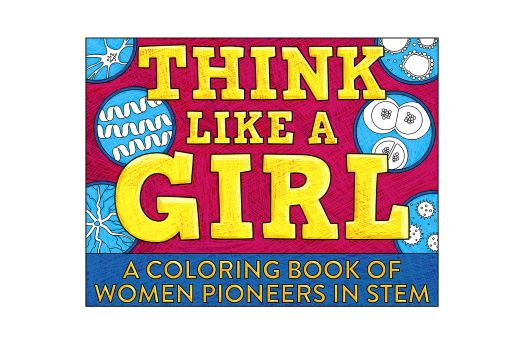
In honor of Black History Month, we are celebrating the incredible research of Black scientists. Follow us on Twitter! According to Martina G. Efeyini, a toxicologist, science communicator and STEM advocate, movements such as #BlackInMicro and #BlackInChem started because “the organizers realized that they did not see scientists who looked like them, and they wanted that to change. These movements made learning about Black scientists more accessible and changed the narrative of what a scientist looks like. They also created a safe space and an environment where encouraging the next generation of Black scientists was at the forefront.”
Please continue to share important news and opportunities with us so that we may share it with you and others who are committed to supporting the careers of exceptional women in science.
With regards in these trying times,

Karla Shepard Rubinger
Executive Director
Rosalind Franklin Society
www.rosalindfranklinsociety.org
News
Research! America to honor public health leadership and innovation in the United States’ response to the pandemic. The BUILDING THE FOUNDATION AWARD, recognizing individuals whose basic research discoveries played a pivotal role in the response to COVID-19, will be awarded to Katalin Karikó, PhD, a Senior Vice President of BioNTech, and Drew Weissman, MD, PhD, Director of Vaccine Research and Professor of Medicine, Infectious Diseases Division, University of Pennsylvania Perelman School of Medicine.
The CLEAR VOICE AWARD will honor two individuals whose effective communication of important health and science information to the public contributed to the fight against COVID-19. Anne Schuchat, MD (RADM, USPHS, RET), the Principal Deputy Director of the Centers for Disease Control and Prevention (CDC), and Michelle A. Williams, SM, ScD, Dean of the Faculty, Harvard T.H. Chan School of Public Health, and Angelopoulos Professor in Public Health and International Development.
Dr. Anthony S. Fauci, Director of the National Institute of Allergy and Infectious Diseases (NIAID) since 1984, will be honored for his continued leadership in service to our nation with the OUTSTANDING ACHIEVEMENT IN PUBLIC HEALTH AWARD.
Postage stamp to honor female physicist who many say should have won the Nobel Prize. Chien-Shiung Wu, a Chinese-American physicist, proved, essentially, that the universe knows its right hand from its left. She never received a Nobel Prize for her demonstration of the effect called parity violation. Now, the U.S. Postal Service (USPS) will issue a stamp commemorating Chien-Shiung Wu on 11 February, the International Day of Women and Girls in Science.
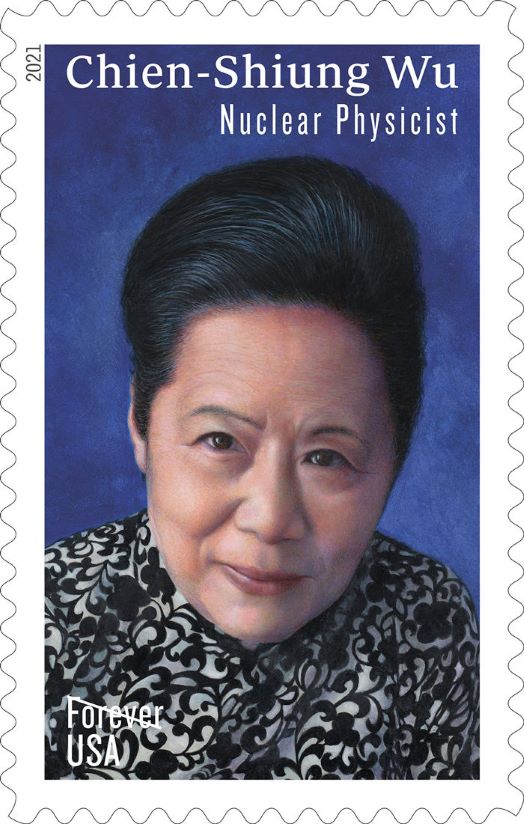
New research to explore seaweed for ocean, economic health. Nichole Price, a Senior Research Scientist at the Bigelow Laboratory for Ocean Sciences, is leading a project that will lay the scientific foundations for a new tool to help restore the health and productivity of our oceans. The researchers will receive a nearly $900,000 grant that will explore how kelp aquaculture can remediate negative effects of climate change.
This COVID-vaccine designer is tackling vaccine hesitancy — in churches and on Twitter. Kizzmekia Corbett, an immunologist at the US National Institutes of Health (NIH), debunks misinformation and shares virus science with her more than 100,000 followers on Twitter. She is one of the scientists who in early 2020 helped to develop an mRNA-based vaccine for COVID-19, in collaboration with biotech firm Moderna of Cambridge, Massachusetts.
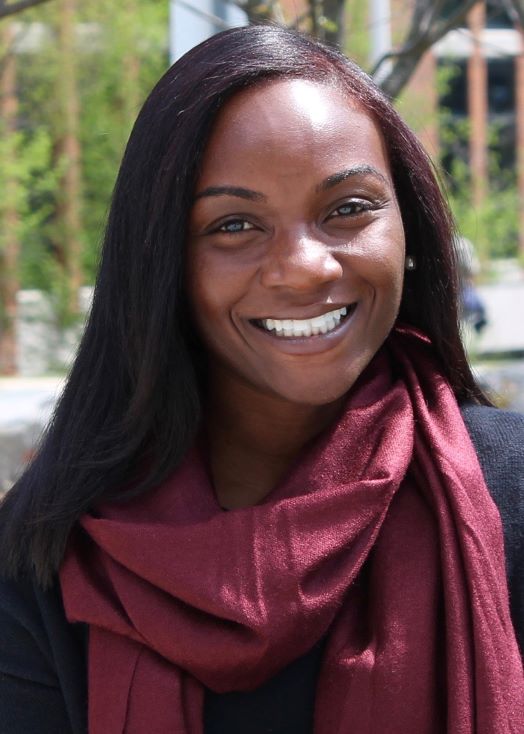 Kizzmekia Corbett is an immunologist at the US National Institutes of Health (NIH). Kizzmekia Corbett is an immunologist at the US National Institutes of Health (NIH).
Pull Up a Chair with Dr. Freire: The COVID Conversations. In this new podcast, Dr. Maria Freire, President and Executive Director of the FNIH, interviews leading researchers and healthcare partners who are working tirelessly to defeat the COVID-19 pandemic. She was a speaker at a recent RFS Board Meeting & Colloquium.
Congratulations to the outstanding mathematicians and theoretical physicists who have been awarded Simons Fellowships in 2021! The Simons Fellows program extends academic leaves from one term to a full year, enabling recipients to focus solely on research for the long periods often necessary for significant advances.
Yale postdoc wins first Cell Press Rising Black Scientists Award. Chrystal Starbird is a postdoctoral fellow who works in the Ferguson Lab at the Yale Cancer Biology Institute. She recently won the first Cell Press Rising Black Scientists Award for an essay detailing her experiences as a person from an underrepresented group in science. It will be published in the February issue of the journal Cell.
NATO scientists study the role of women in combat units. A new study by the NATO’s Science and Technology Organization (STO) found that many NATO and partner countries are integrating women into ground close combat units and the roles open to women are increasing.
Zoe Donaldson is an Assistant Professor in the Department of Molecular, Cellular, and Developmental Biology & Department of Psychology and Neuroscience at the University of Colorado Boulder. Fascinated by the central role of love in art, literature, and everyday life, Zoe Donaldson decided to investigate the neuroscience of this powerful emotion. In 2016, she realized that she was in the ideal position to take advantage of newly emerging optical techniques to investigate brain function, and started applying these methods to voles.
Pandemic hit academic mothers especially hard, new data confirm. New survey on 20,000 scientists shows that mothers suffered a 33% larger drop in research hours compared with fathers during pandemic. Mothers also spent more time on child care and housework than fathers.
22 pioneering women in science history you really should know about: We’ve all heard of Ada Lovelace, Rosalind Franklin and Marie Curie, but there are many more famous women in STEM that deserve your attention. Katherine Johnson was a mathematician who worked on NASA’s early space missions and was portrayed by Taraji P Henson in the film Hidden Figures. She was one of the “computers” who solved equations by hand during NASA’s early years. Grace Hopper was a pioneering computer programmer and one of the first women to achieve a PhD in mathematics.
6 women who are changing chemistry as we know it: Here are the stories of six chemists – three of them Nobel Prize winners – who are performing incredible research in the fields of medicine, biotechnology, space science, forensics, and more.
As more women enter science, it’s time to redefine mentorship: “Mentoring is not just about opening the door,” says Audrey Murrell, a professor of business administration, psychology, and public and international affairs at the University of Pittsburgh. “It’s about making people feel welcome. It’s about developing them, it’s about providing for the whole person.”
Science Not Politics: How Dr. Rochelle Walensky is Saving the CDC. “My CV makes it look easy, but it hasn’t always been. For every paper or grant I have submitted, 80 to 90 percent of them have been rejected, which is why I tell my students they have to love the pursuit of the question,” says the CDC director, Dr. Rochelle Walensky.
Women scientists are bearing the brunt of COVID-19′s impacts. As the COVID-19 pandemic reaches almost a year within the United States, it is clear that those who have suffered the most are working mothers, as well as beginning academics, writes Kristen Vogt Veggeberg for Massive Science.
Breaking the science glass ceiling: four African women share what it took. Less than 30% of researchers worldwide are women. In this article, four African women scientists share their experiences in forging STEM careers. Professor Aina Adeogun’s personal principle is: “If there is one reason why a particular concept will work, then pursue that one reason and leave out the 50 reasons why it won’t work.”
Teen founds initiative to bring STEM to young, inner-city girls: 'I want them to see that you can be a woman of color and still go into this field'. “The goal behind every single event I do, whether I have the girls come to me at a big Girls Empowerment STEM Event or whether I go to them in the schools or in the community centers, is to make science fun and accessible for them,” said 17-year-old Jacqueline Means.
Events
Breakthrough Festival: A Celebration Of Women In STEM. From February 15-21, join Science Friday and 500 Women Scientists for a celebration amplifying the voices of women scientists. This is a science learning event series for all ages featuring interactive online activities and conversations highlighting equity and women in STEM. Each day will focus on a video from the Breakthrough series produced by Science Friday and HHMI Tangled Bank Studios.
BIG Discussions about CRISPR: A Black History Month Conversation. Join experts in the field to learn about CRISPR genome editing and celebrate Black excellence in genetics. (February 25, 2021 at 6pm EST)
Opportunities
Apply now for the GMiS STEM Scholarships: The application period for the 2021-22 academic year is open. The deadline is April 30, 2021.Applications are open to any graduating high school senior, undergraduate, or graduate student, from a traditionally underserved or underrepresented group in science, technology, engineering, math or health.
Marianna Limas, Social Media Manager
Nilda Rivera, Partnership and Events Manager
|
RFS Briefings - February 1, 2021
Dear Colleagues,
STAT’s biotech podcast, "The Readout LOUD", recently dedicated an entire episode to Sharon Begley, their revered and beloved colleague who died this month from complications of lung cancer. First, STAT’s Eric Boodman discussed Sharon’s path-breaking career and what he learned from reporting out her obituary. Then, a trio of STAT editors called in to talk about what it was like to work with Sharon, and they heard from a number of her colleagues about what made her a singular writer, mentor, officemate, and friend.
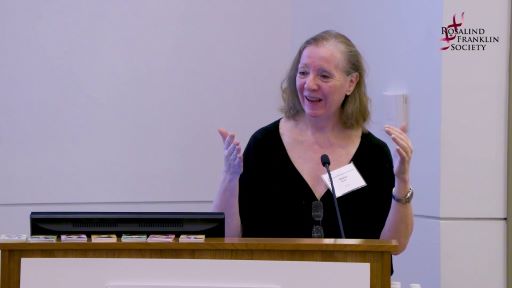 Sharon Begley speaking at a Rosalind Franklin Board Meeting and Colloquium. Sharon Begley speaking at a Rosalind Franklin Board Meeting and Colloquium.
Please continue to share important news and opportunities with us so that we may share it with you and others who are committed to supporting the careers of exceptional women in science.
With regards in these trying times,

Karla Shepard Rubinger
Executive Director
Rosalind Franklin Society
www.rosalindfranklinsociety.org
News
Janet Woodcock to lead FDA on interim basis. Janet Woodcock, who has led the Food and Drug Administration’s drug review efforts for years, is slated to oversee the agency on an interim basis. Dr. Woodcock joined the FDA in 1986, and has most recently overseen the FDA’s Center for Drug Evaluation and Research.
All-female team delivers COVID-19 vaccines by snowmobile in harshest of conditions in rural Alaska. The team of one medical doctor, one pharmacist, and two nurses traveled in one day by plane, sled and snowmobile to deliver the vaccine to people across rural northern Alaska. "It's just such an incredible opportunity to work with them," said Meredith Dean, a 25-year-old resident pharmacist, for Good Morning America. "It was definitely an impactful and powerful moment to realize that we've all braved quite a bit to get there and provide care."
‘Inspired choice’: Biden appoints sociologist Alondra Nelson to top science post. Alondra Nelson has been appointed deputy director of science and society at the White House Office of Science and Technology Policy. “She understands exactly what is needed to ensure that research has maximum impact on policy,” according to Kate Crawford, a senior principal researcher at Microsoft. “I think that is the real gift that the White House is getting” with Nelson on the team, she said in an article for Nature News.
Alondra Nelson, president of the Social Science Research Council and the Harold F. Linder Professor of Social Science at the Institute or Advanced Study. Credit: Dan Komoda.
The University of Western Australia’s first female math professor receives highest Australia Day honors. Professor Cheryl Praeger is one of just four people Australia-wide to be awarded a Companion in the General Division of the Order of Australia. She was acknowledged for her eminent service to mathematics; to tertiary education; to international organizations; as a leading academic and researcher and as a champion of women in STEM careers.
Princeton researchers study the many impacts of COVID-19. Within days of shutting down their laboratories in response to the COVID-19 pandemic in March 2020, Princeton researchers were asking how they could help. As people began working from home, Maria Micaela Sviatschi, assistant professor of economics and public affairs in Princeton’s School of Public and International Affairs, decided to analyze the increase in domestic violence. Although the study is not yet complete, some women reported abusive behaviors. To study the effect of business shutdowns, assistant professors of economics Natalie Cox and Arlene Wong, with co-authors at the University of Chicago, examined bank account data from millions of customers. They found that household spending plunged similarly across all income levels in March and April 2020, and that government payments appear to have benefited low-income households.
Diversity in STEM
We need STEM mentors who can reduce bias and fight stereotypes. Building a diverse and highly-skilled generation of scientists begins by example. To thrive, women in STEM need a mentoring environment that allows them to be heard and acknowledged. “Mentors must actively engage trainees while listening and allowing for their intellectual independence. In chaotic and unpredictable times, creating a sensitive and dynamic generation of scientists begins by example,” writes Stephanie Knezz, an assistant professor of instruction in the Department of Chemistry at Northwestern University.
Making science fair: Applying psychology to create equity in STEM. In this webinar, Aziza Belcher Platt discusses the impact of systemic inequity at both a personal and societal level and provides tools to assess racial-cultural identities, intersections, and experiences.
Ideas
Listen to this episode of Lightbulb Moment with Wyss Institute 's Technology Translation Director Angelika Fretzen, where she discusses business, entrepreneurship, pharmaceuticals, and their relevance in the COVID-19 pandemic.
Certain of her own exceptional nature, physician Elizabeth Blackwell dismissed those who aided her. In The Doctors Blackwell: How Two Pioneering Sisters Brought Medicine to Women—and Women to Medicine, Janice Nimura writes that “when the Blackwell sisters died, there were more than nine thousand women doctors in the United States, about six percent of all physicians.” “Today,” Nimura continues, “thirty five percent of physicians—and slightly more than half of all medical students—are female.”
Ten suggestions for female faculty and staff during the pandemic: 1) Find a peer group of women to provide professional support, 2) When you have energy to do more than the minimum, use that in support of women and underrepresented groups, 3) Whatever help you can get, take it, 4) Do your best to remember that others are struggling too—be empathetic and work to build a community, and more.
Why you should ‘be an actor, not an ally’ for women in STEM. Anna Rafferty, director of strategy at Johnson & Johnson Ireland, talks about the company’s program to support women in STEM. “Don’t focus on raising awareness,” she said. “What I would say is be an actor, not an ally. And do get out there and get active. But I think also join forces with others; don’t try and do it on your own.
A fireside chat with Vicki Sato. Dr. Vicki Sato is a chairman of the board at Vir Biotechnology and Denali Therapeutics. In this episode of Science Rehashed, Dr. Vicki Sato shares her eclectic career journey and some hard-earned lessons, as well as the changing face of the biotech industry and the current urgency of science-driven entrepreneurship.
Opinion: Peer review study compromises response to gender bias. Ada Hagan and colleagues analyzed the peer-review outcomes from 108,000 manuscript submissions to 13 American Society for Microbiology (ASM) journals. Their study found a consistent trend for manuscripts submitted by women corresponding authors to receive more negative outcomes than those submitted by men. In an opinion piece, she argues that a recent analysis that claimed no evidence of gender-based peer review outcomes fails to account for several factors.
Resources
New book: Women: Why equality, health and safety matter to everyone. “Women have too long been an afterthought: denied equal opportunity at home and in society and ignored by science. Recent decades brought progress toward some measure of parity, but yawning gaps remain, and some are growing, threatening to undermine everyone’s well-being.” This new book highlights research on the scientific and economic implications of gender disparity in the realms of economics, politics, education and health care.
The Science of Mentorship Podcast: In this episode, Dr. Akiko Iwasaki tells the story of her journey through STEMM academia and beyond as a woman from Japan. There were times she was discouraged from continuing her studies, but supportive mentors guided her through difficult situations. Dr. Akiko Iwasaki is a professor and researcher in immunology at the Yale School of Medicine. She has contributed significant research to the field of innate immunity against multiple viruses and cancer. She was a speaker at our recent meeting Labs, Leaders, Critical Connections.
|
RFS Briefings - January 19, 2021
Dear Colleagues,
President-elect Joe Biden is signaling that scientists will assume prominent roles in his administration! He named Nobel chemistry laureate Frances Arnold, a pioneer in synthesizing artificial proteins, and MIT Vice President for Research Maria Zuber, a planetary scientist who led efforts to map the surfaces of the moon and Mars, to head the President’s Council of Advisors on Science and Technology. They will be the first women to co-chair the council. Biden plans to make the White House Office of Science and Technology Policy a Cabinet-level agency. Alondra Nelson, the president of the Social Science Research Council, will serve as the OSTP’s deputy director for science and society.
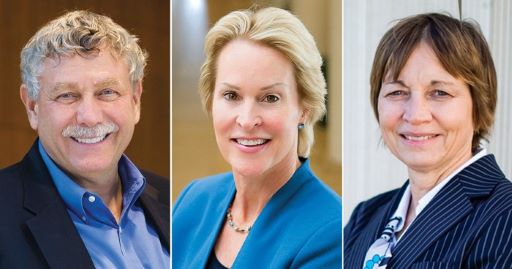 Eric Lander, Frances Arnold, and Maria Zuber. Credit: Biden-Harris Transition (Lander), Caltech (Arnold), Bryce Vickmark (Zuber), via C&EN. Eric Lander, Frances Arnold, and Maria Zuber. Credit: Biden-Harris Transition (Lander), Caltech (Arnold), Bryce Vickmark (Zuber), via C&EN.
Inside the C.I.A., she became a spy for planet Earth. Linda Zall is disclosing how she toiled anonymously within the intelligence agency to help scientists intensify their studies of climate change. “She was an amazing leader,” said Michael B. McElroy, a planetary physicist and professor of environmental studies at Harvard. “She had energy and enthusiasm and a wonderful ability to communicate with people” — as well as the tact to handle large egos. “Having this woman from the C.I.A. telling them what to do wasn’t easy. It was amazing to watch her.”

Female scientists focus on a secret weapon to fight climate change: Moms. Climate researcher Katharine Hayhoe has teamed up with five fellow climate scientists to found Science Moms, a group that aims to demystify climate change, talk honestly about how it will affect their children and give moms the facts they need to take action. The campaign has a website featuring facts and resources, including links to books on talking to kids about climate and a form for contacting elected officials.
“As the new C.D.C. Chief, I’ll tell you the truth, even when the news is bleak.” Rochelle P. Walensky has been chosen by President-elect Joe Biden to be the director of the Centers for Disease Control and Prevention. “I promise to work with my colleagues at the C.D.C. to harness the power of American science to confront the enormous challenges we face,” she wrote in an opinion piece for The New York Times.
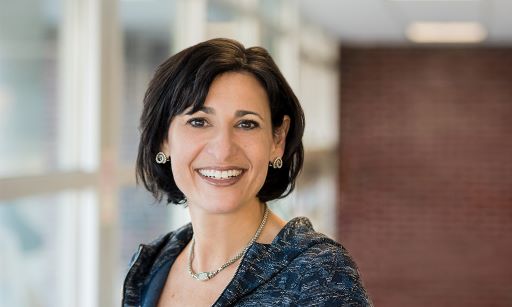 Rochelle Walensky, MD, MPH. Chief, Division of Infectious Diseases Professor of Medicine, Harvard Medical School Rochelle Walensky, MD, MPH. Chief, Division of Infectious Diseases Professor of Medicine, Harvard Medical School
Fifteen-year-old Gitanjali Rao is a scientist, inventor, and TIME Magazine's first-ever 'Kid Of The Year.' In this episode of Short Wave, she shares why she didn't initially think science was for her, what motivates her now, and a bit of advice for other budding innovators.
Developmental Biologist Kathryn Anderson dies at 68. Kathryn Anderson, a developmental biologist at the Memorial Sloan Kettering Cancer Center known for her work detailing the genetics of early embryogenesis, died November 30 at age 68. For her contributions to the field of developmental biology, Anderson was inducted into the National Academy of Sciences in 2002 and elected as a member of the Institute of Medicine of the National Academies in 2008.
Sisters who kicked down the door of the US medical establishment. Writer and historian Janice Nimura reveals the struggles faced by the first female physician in the United States, Elizabeth Blackwell, and her sister Emily, also a doctor, in a new book, The Doctors Blackwell. According to Hannah Wunsch, “it took until 2017 for women to make up more than half of US medical-school enrolment. And scepticism remains rampant that a woman, or a physician from a minority group, can wield a scalpel or provide expert advice as well as a white man.”
One page at a time, Jess Wade is changing Wikipedia. By day, Jess Wade is an experimental physicist at Imperial College London. But at night, she writes entries about women and POC scientists on Wikipedia. In this episode of Short Wave, she chats with Emily Kwong about how Wikipedia can influence the direction of scientific research and why it's important to have entries about scientists from under-represented communities.
Meet 10 female scientists instrumental in developing COVID-19 vaccines around the world. “The various vaccines which have been developed in different parts of the world stem from the brain-racking and hard-work of many exemplary women who are dedicated to the cause of liberating the humankind from the clutches of the virus,” writes Sugandha Bora.
MIT Society of Women Engineers’ journey into virtual connection. “When the student body was sent home last March in the face of the Covid-19 pandemic, the MIT Society of Women Engineers (SWE) faced its biggest challenge yet — transitioning nearly 70 in-person programming events to an entirely virtual experience,” writes Stephanie Tran. In addition to promoting diversity among women engineers, SWE seeks to introduce students of all ages, from grade school to high school, to STEM fields.
Gwynne Shotwell talks about selling flight-proven rockets, Starship. Gwynne Shotwell, SpaceX’s president and chief operating officer, believes 2020 was a year of highlights. "There's probably 10 things that I would look back on this year and say were extraordinary.” Safely launching astronauts was probably the biggest one, however. "Getting Bob and Doug to orbit and back safely, especially in that timeframe, it was such a terrible time in the world, that was great," she said.
Diversity in STEM
‘I was no longer pretending or hiding’: a trans scientist finds a lab to call home. In an article for Nature News, materials scientist Clara Barker praises the University of Oxford for creating a welcoming space. “What’s most inspiring about our lab is the people I work with: they accept me and treat me as a scientist, so that I can just focus on my work. Since I came here in 2015, Oxford has given me a platform for me to share my story as a trans scientist through talks and articles. It’s such a privilege and an honour to have that visibility,” Barker says.
How to include Indigenous researchers and their knowledge. Despite long-standing calls to increase diversity on university campuses, Indigenous researchers remain poorly represented in STEM fields. Nature spoke to four Indigenous academic scientists about the challenges they face, and how scientists can respectfully and effectively bring together traditional knowledge and Western science.
Lack of support undermines minority and female chemistry PhDs. A recent paper shows that graduate students from a racial/ethnic group traditionally underrepresented in chemistry were significantly less likely than other students to report that their financial support was sufficient to meet their needs. They were also less likely to report having supportive relationships with peers and postdocs, and advisors.
Women and minorities in weather and climate fields confront harassment, lack of inclusion. Professional scientific groups, like The American Geophysical Union (AGU) and the American Meteorological Society (AMS), say they are ideally positioned to create change. According to the Washington Post, more than 120 science societies in 2019 banded together to form the Societies Consortium on Sexual Harassment in STEMM to coordinate standards of conduct and share information.
Resources
The National Academies of Sciences, Engineering, and Medicine released a new podcast, The Science of Mentorship. This 10-part series explores how students in STEMM can discover more of their potential when they have responsive and effective mentors, told through the personal stories of top researchers in the United States. Learn how evidence-based mentorship practices can help you develop the skills to engage in the most effective STEMM mentoring relationships possible. The first episode features the incoming Chair of the Committee on Women in Science, Engineering, and Medicine, Dr. Gilda Barabino.
Founded by 500 Women Scientists, Gage is a new global search platform where journalists, media outlets, conference planners and others seeking brilliant voices in science can discover women and gender minorities in STEMM. Their mission is to serve society by making science open, inclusive, and accessible.
Opportunities
Nominations are now open for the National Academy of Medicine's 2021 Gustav O. Lienhard Award for Advancement of Health Care and Rhoda and Bernard Sarnat International Prize in Mental Health. Help the NAM recognize health care services pioneers and mental health innovators - nominate a colleague today! Nominations will remain open until April 16, 2021.
The Simons Collaboration on the Global Brain is launching a Bridge to Independence Award! SCGB's BTI facilitates the transition of the next generation of systems and computational neuroscientists to research independence by providing grant funding at the start of their professorships. This request for applications (RFA) is aimed at Ph.D. and M.D.-holding scientists who are currently in training positions but intend to seek tenure-track research faculty positions during the upcoming academic job cycle. Fellows will receive a commitment of $495,000 over three years, activated upon assumption of a tenure-track research professorship.
Marianna Limas, Social Media Manager
Nilda Rivera, Partnership and Events Manager
|
RFS Briefings - January 5, 2021
Dear Colleagues,
As we begin a new year, we are all hoping for all the progress of science and the promise of new discoveries, worldwide.
Laying the groundwork for this optimism, I encourage you to take advantage of the recordings of our 2020 end-of-year virtual meeting which took place on December 16 and 17: Labs, Leaders, Critical Connections. This is an incredibly rich collection of presentations which will introduce you to several amazing young scientists, some eminent leaders you may already know, and exciting new voices to help us see that Black Scientists Matter!
And, before we completely leave 2020 behind, I urge you to visit the presentations from our 4-part series of Women in Science hosted with Genetic Engineering and Biotechnology News. You do not want to miss these:
- The Life and Times of Rosalind Franklin: British biologist and author Dr. Matthew Cobb explores Franklin’s contribution to DNA structure and how they have been seen in popular culture.
- The Empowerment of Having a Lab of One’s Own: Dr. Rita Colwell, president of the Rosalind Franklin Society, is a pioneering microbiologist and the first woman to lead the National Science Foundation. She is a Distinguished University Professor at both the University of Maryland and Johns Hopkins University’s Bloomberg School of Public Health.
- The Great Convergence: How Biology and Engineering Unite to Reshape our World. Renowned neuroscientist Dr. Susan Hockfield, who served as president of MIT from 2004–2012, shares her views of the future that she lays out in her recent book, The Age of Living Machines: How Biology Will Build the Next Technology Revolution.
- Conversation with special guest Nobel Prize Laureate Jennifer Doudna, PhD (University of California, Berkeley/HHMI) was recently awarded the 2020 Nobel Prize in Chemistry with Emmanuelle Charpentier, PhD, a microbiologist at the Max Planck Institute in Berlin. Doudna has embraced her leadership role, spearheading vital discussions about the ethics of hereditary genome editing, championing the value of basic academic research, and serving as an inspirational role model for women in science.
Please continue to share important news and opportunities with us so that we may share it with you and others who are committed to supporting the careers of exceptional women in science.
News
Researchers retract controversial female mentorship paper. The authors of a study that suggested female scientists who have female mentors have worse career outcomes have retracted the paper. Their conclusions, including a finding that “current diversity policies promoting female-female mentorships, as well-intended as they may be, could hinder the careers of women,” provoked social media outrage and criticism of their methods. Critics attacked both the study’s conclusions and the methods used to reach them, according to Science Magazine.
Inside the C.I.A., She Became a Spy for Planet Earth. Read the amazing story of a behind-the-scenes scientist who was instrumental in harnessing the power of spy satellites to observe a wide range of environmental ills and change on the Earth’s surface. In an interview for The New York Times, Linda Zall talks about how she toiled anonymously within the intelligence agency to help scientists intensify their studies of a changing planet.
Dava Newman named director of MIT Media Lab. “Leading the legendary Media Lab is a dream for me, and I can’t wait to help write the next chapter of this uniquely creative, impactful, compassionate community,” Newman says. Currently she is the Apollo Program Professor of Astronautics in MIT’s Department of Aeronautics and Astronautics, and a faculty member in the Harvard-MIT Program in Health Sciences and Technology.
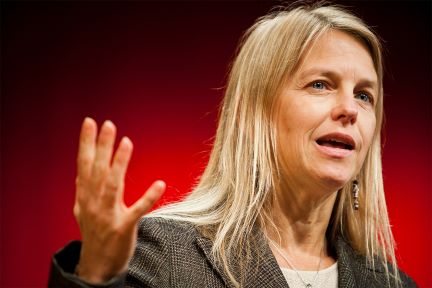
New MIT Media Lab Director Dava Newman. Image: Dominick Reuter
The engineer using science to build a better world after coronavirus. Dr. Pinar Keskinocak, the director of the Center for Health and Humanitarian Systems at Georgia Tech, is using her eclectic expertise and positions of leadership to fix crucial flaws in global operations, all while elevating the next generation of scientists. She is leading some of the top COVID-19 pandemic research and became president of The Institute for Operations Research and the Management Sciences (INFORMS) this year.
Twist Bioscience plots its 'factory of the future' in Oregon, seeks to expand synthetic DNA client base. Twist, which manufactures synthetic DNA by writing it on a silicon chip platform, will build a 110,000-square-foot facility near Portland, Oregon, that will more than double its current production capacity by the time the facility is operational in 2022, according to Endpoints News. “We are expanding our customer base and ramping production of our products at an exceptional rate. The Factory of the Future allows us to support the increasing needs of our customers as they scale globally and plan for aggressive growth into synthetic biology and biopharma market segments we cannot serve today,” said Emily M. Leproust, Ph.D., CEO and co-founder of Twist Bioscience. Dr. Leproust was the winner of the 2020 Rosalind Franklin Award given by BIO, and she was a featured speaker at our recent RFS end-of-year virtual meeting: Labs, Leaders, Critical Connections. You can view the presentations here.
How mRNA went from a scientific backwater to a pandemic crusher. For years, Katalin Karikó's work into mRNA therapeutics was overlooked by her peers. Now it's being used to develop two leading Covid-19 vaccines. She has been at the helm of BioNTech’s Covid-19 vaccine development. In 2013, according to the WIRED, she accepted an offer to become Senior Vice President at BioNTech after UPenn refused to reinstate her to the faculty position she had been demoted from in 1995. “They told me that they’d had a meeting and concluded that I was not of faculty quality,” she said. ”When I told them I was leaving, they laughed at me and said, ‘BioNTech doesn’t even have a website.’”
Documentary shares stories of harassment against women in STEM. “Picture a Scientist” cites a report on sexual harassment in STEM released in 2018 by the National Academies of Sciences, Engineering and Medicine that estimates 50 percent of women faculty and staff in STEM have experienced sexual harassment. The documentary also features one of the RFS founders, Dr. Nancy Hopkins, who was central to the research at MIT to meticulously document the discrimination against female scientists in hiring, promotion, and even lab space!
Marianna Limas, Social Media Manager
Nilda Rivera, Partnership and Events Manager
|
|
|